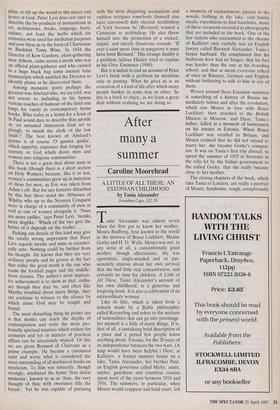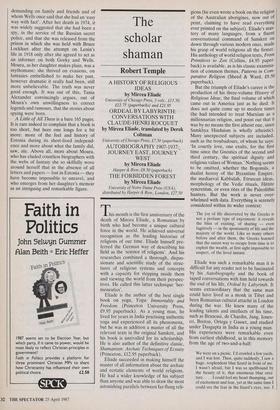After many a summer
Caroline Moorehead
A LITTLE OF ALL THESE: AN ESTONIAN CHILDHOOD by Tania Alexander
Jonathan Cape, £12.50
Tania Alexander was almost seven when she first got to know her mother, Moura Budberg, best known to the world as the mistress of Bruce Lockhart, Maxim Gorky and H. G. Wells. Moura was not, in any sense at all, a conventionally good mother: though affectionate, she was egocentric, single-minded and so pas- sionately anxious about her own survival that she had little real concentration, and certainly no time for children. A Little of All These, Tania Alexander's account of her own childhood, is a generous and forgiving book. It is also a celebration of an extraordinary woman.
Like its title, which is taken from a remark made by a Baltic philosopher called Keyserling and refers to the mixture of nationalities that can go into parentage, her memoir is a little of many things. It is, first of all, a tantalising brief description of a place and a period few people know anything about: Estonia, for the 20 years of its independence between the two wars. (A map would have been helpful.) Here, at Kallijarv, a former summer house on a lake, Tania Alexander, her brother Paul, an English governess called Micky, aunts, uncles, guardians and countless cousins spent most of the years between 1918 and 1934. The summers, in particular, when Moura would reappear and hold court, left a memory of enchantment: picnics in the woods, bathing in the lake, vast family meals, expeditions to find hazelnuts, many of these occasions recorded in photographs that are included in the book. One of the few visitors who succumbed to the charms of Kallijary only ruefully was an English lawyer called Bernard Alexander, Tania's future husband. He complained that his bedroom door had no hinges, that his bed was harder than the one at his boarding school, and that at meals everyone talked at once in Russian, German and English without bothering to talk to him in any of them.
Woven around these Estonian summers is something of a history of Russia im- mediately before and after the revolution, which saw Moura in love with Bruce Lockhart, then attached to the British Mission in Moscow, and Djon, Tania's father, killed at a moment of lawlessness on his estates in Estonia. When Bruce Lockhart was recalled to Britain, and Moura realised that he did not intend tc marry her, she became Gorky's compan- ion. It was on Tania's first trip abroad, to spend the summer of 1925 in Sorrento in the villa let by the Italian government to the exiled Gorky, that she really became close to her mother.
The closing chapters of the book, which take Tania to London, are really a portrait of Moura, handsome, tough, exceptionally demanding on family and friends and of whom Wells once said that she had an 'easy way with fact'. After her death in 1974, it was widely suggested that she had been a spy, in the service of the Russian secret police, and that she was released from the prison in which she was held with Bruce Lockhart after the attempt on Lenin's life in 1918 only after she agreed to act as an informer on both Gorky and Wells. Moura, as her daughter makes plain, was a mythomane: she thrived on evasions, on fantasies embellished to make her past, however dramatic it really had been, still more unbelievable. The truth was never good enough. It was out of this, Tania Alexander convincingly argues, out of Moura's own unwillingness to correct legends and rumours, that the stories about spying were born.
A Little of All These is a bare 165 pages. It is rare indeed to complain that a book is too short, but here one longs for a bit more: more of the feel and history of Estonia during its short-lived independ- ence and more about what the family did, saw, ate. Above all, more about Moura, who has eluded countless biographers with the webs of fantasy she so skilfully wove around herself that in the absence of all letters and papers — lost in Estonia — they have become impossible to unravel, and who emerges from her daughter's memoir as an intriguing and remarkable figure.



































































 Previous page
Previous page